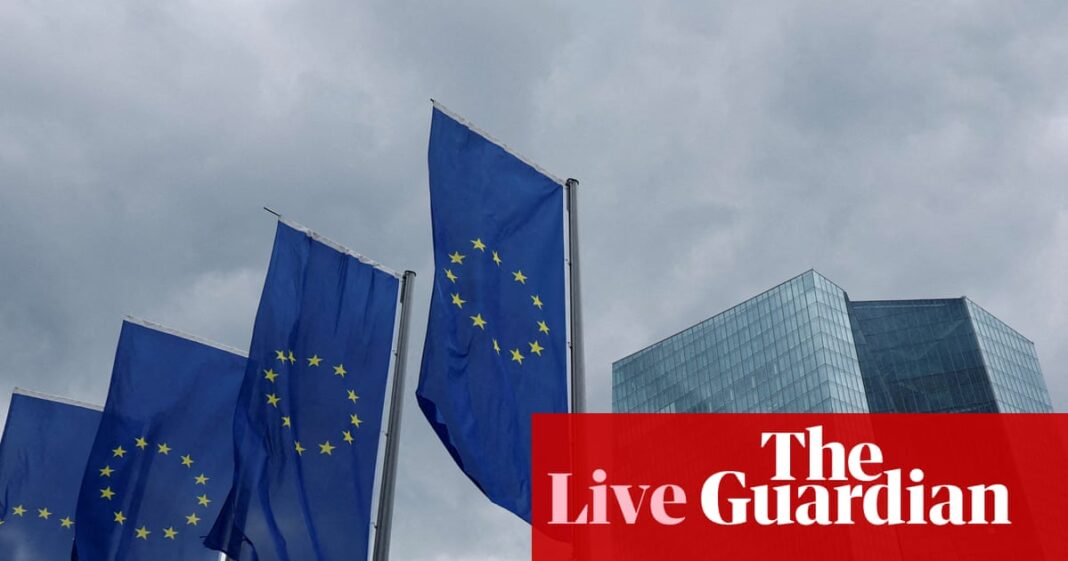US inflation rises to 2.9%
Newsflash: US inflation jumped last month, which could harden fears that Donald Trump’s trade war is driving up the cost of living for Americans.
The US consumer prices index rose by 2.9% in the year to August, up from 2.7% in July, in line with forecasts.
Food prices rose by 3.2% over the year, the Bureau of Labor Statistics reports, while energy prices were only up by 0.2% over the last year.
Core inflation, which strips out food and energy costs, rose by 3.1% in the 12 months to August.
Key events
Tariffs ‘clearly hitting’ as US inflation rises
On a monthly basis, the US inflation report shows prices rose by 0.4% in August alone.
That’s twice as fast as the 0.2% rise in prices recorded in July.
The BLS reports that housing (shelter) and food were key drivers:
The index for shelter rose 0.4 percent in August and was the largest factor in the all items monthly increase. The food index increased 0.5 percent over the month as the food at home index rose 0.6 percent and the food away from home index increased 0.3 percent.
Heather Long, chief economist at credit union Navy Federal, says “Tariffs are clearly hitting now”
JUST IN: Tariffs are clearly hitting now. U.S. Inflation rises to 2.9% (y/y) in August–>up from 2.3% in April.
Higher food, gas and shelter costs drove inflation up in August. Cars, apparel and airfares also saw costs surge. ***Inflation jumped 0.4% during the month, the… pic.twitter.com/ap0q4r4OxW
— Heather Long (@byHeatherLong) September 11, 2025
US inflation rises to 2.9%
Newsflash: US inflation jumped last month, which could harden fears that Donald Trump’s trade war is driving up the cost of living for Americans.
The US consumer prices index rose by 2.9% in the year to August, up from 2.7% in July, in line with forecasts.
Food prices rose by 3.2% over the year, the Bureau of Labor Statistics reports, while energy prices were only up by 0.2% over the last year.
Core inflation, which strips out food and energy costs, rose by 3.1% in the 12 months to August.
Today’s statement from the European Central Bank doesn’t include any assessment of the eurozone economy, or cite any particular risk worrying policymakers.
It does, though, repeat the ECB’s pledge that it is “not pre-committing” to a particular path for interest rates, and will set policy based on data and infation dynamics.
It says:
The Governing Council is determined to ensure that inflation stabilises at its 2% target in the medium term. It will follow a data-dependent and meeting-by-meeting approach to determining the appropriate monetary policy stance.
In particular, the Governing Council’s interest rate decisions will be based on its assessment of the inflation outlook and the risks surrounding it, in light of the incoming economic and financial data, as well as the dynamics of underlying inflation and the strength of monetary policy transmission. The Governing Council is not pre-committing to a particular rate path.
Reuters’ correspondent Francesco Canepa says this takes being “deliberately” uninformative to new levels…
we knew the #ecb wanted to “deliberately” uninformative but the latest policy statement takes the cake. No analysis of current economic conditions, no reference to any particular risk. That increases the weight on Lagarde in a few minutes and on the projections’ report later
— francesco canepa (@FranCanJourno) September 11, 2025
ECB lifts inflation forecast for 2025 and 2026
We also have new inflation forecasts from the European Central Bank.
They now predict the cost of living will rise a little faster than it had expected this year and next.
ECB forecasts now estimate headline inflation will average 2.1% in 2025, up from 2% forecast in June.
Inflation is then expected to slip to 1.7% in 2016, up from the 1.6% forecast three months ago, For 2027, it’s seen at 1.9%, below the 2.0% forecast in June.
The ECB’s goal is to keep inflation at 2% over the medium term.
New ECB growth forecasts
The ECB has also raised its forecast for eurozone growth this year (hurrah!), but tempered this by slightly cutting its 2026 forecast.
It says:
The economy is projected to grow by 1.2% in 2025, revised up from the 0.9% expected in June. The growth projection for 2026 is now slightly lower, at 1.0%, while the projection for 2027 is unchanged at 1.3%.
ECB leaves eurozone interest rates on hold
Newsflash: The European Central Bank has left interest rates across the eurozone unchanged, at its latest policy meeting.
Announcing the decision, the ECB says:
Inflation is currently at around the 2% medium-term target and the Governing Council’s assessment of the inflation outlook is broadly unchanged.
The decision means:
-
The ECB’s deposit facility, used by banks to make overnight deposits with the Eurosystem, remains at 2%.
-
The main refinancing operations rate, paid when banks can borrow funds from the ECB on a weekly basis, remains at 2.15%.
-
The marginal lending facility rate, paid when banks borrow overnight from the ECB, remains at 2.4%
Tube strike latest
Meanwhile in London, the underground system remains seriously disrupted by today’s strike action.
Most tube lines are still suspended, with three exceptions:
-
District Line: Service is operating with minor delays between Upminster and Whitechapel only
-
Metropolitan Line: Service is operating with minor delays between Baker Street and Watford only.
-
Piccadilly Line: Service is operating with minor delays between Acton Town and South Harrow and Arnos grove to Cockfosters only.
Turkey cuts interest rates by more than expected
Over in Istanbul, Turkey’s central bank has announced a large cut to interest rates, but borrowing costs still remain high.
Turkey’s central bank has lowered its policy interest rate by 250 basis points to 40.5%, a slightly bigger cut than expected.
It eased policy after inflation slowed to 32.95% in August 2025 from 33.52% in July.
The Central Bank of the Republic of Türkiye explained:
The underlying trend of inflation slowed down in August. While GDP growth was above projections in the second quarter, final domestic demand remained weak. Recent data indicate that demand conditions are at disinflationary levels. Food prices and service items with high inertia are exerting upward pressure on inflation. Inflation expectations, pricing behavior, and global developments continue to pose risks to the disinflation process.
The tight monetary policy stance, which will be maintained until price stability is achieved, will strengthen the disinflation process through demand, exchange rate, and expectation channels.

Kalyeena Makortoff
Back in the UK, the motor finance firm which lost a key case at the supreme court last month has put aside an extra £122m for compensation for UK drivers, but denied that the ruling set precedent for mass payouts.
FirstRand, which owns UK car lender MotoNovo, said it had taken a 2.7 billion rand provision, and absorbed another R253m in legal and professional fees, in relation to the car finance case, resulting in a R2.9bn (£122m) charge for the financial year to 30 June.
However, this did not hinder its financial success, having reported a 10% rise in net profit to R41.82bn – marking a fresh record high, according to Bloomberg.
The South African lender is steeling itself for a compensation scheme that could collectively cost lenders £18bn. The FCA scheme, which is due to go out for consultation next month, is meant to draw a line under the car finance scandal, compensating millions of drivers who were overcharged as a result of controversial commission arrangements between lenders and car dealers.
It follows a supreme court ruling in August, which ruled against FirstRand and sided with a former borrower.
Judges upheld the case lodged by Marcus Johnson, saying the terms of the deal were “unfair”, due in part to the size of the commission that was paid to the car dealer, as well as the fact that it was never disclosed that FirstRand had first dibs on the contract.
But in filings released alongside its annual report on Thursday, FirstRand pushed back against any suggestions that Johnson’s case would open the door to a raft of costly claims against the South African lender.
It said:
“The group’s view is that although the UK Supreme Court ordered repayment of commission (plus interest at an undefined commercial rate) in this particular case, this does not create a precedent for other courts to follow as any remedy for an unfair relationship should be based on the specific facts.
“It is important to note that the level of commission in the Johnson case is not indicative of the level of commission across the overall MotoNovo book.
“Less than 3% of total commissions pre-2021 match the Johnson commission outcome, which was 25% of advance
and 55% of total charge for credit. It is worth pointing out that Mr Johnson received the lowest interest rate available from FirstRand Bank London branch via the motor dealer selling the car.”
In another sign of trouble in Europe’s largest economy, German business insolvencies have risen this year.
The number of standard insolvencies filed in Germany increased by 11.6% in August 2025 compared to the same month last year, statistics body Destatis reported this morning.
Destatis also showed there were 12.2% more corporate insolvencies in the first half of this year than in January-June 2024, with consumer insolvencies up by 7.5%.
The slowdown in German exports may be on the European Central Bank governing council’s mind when it sets interest rates later today.
The ECB is expected to leave eurozone interest rates on hold, as it weighs up the state of the eurozone economy and the outlook for inflation.
Michael Field, chief equity strategist at Morningstar, says:
“It seems the ECB will be holding interest rates steady at 2%, for the third straight month, if economists’ expectations are anything to go by. A decision we can certainly the logic in, given where inflation, and the health of the underlying economy currently.
The ECB’s calls on interest rates have been a large success, cutting fast and hard over the last year or so. Particularly considering recent criticism of the US Federal Reserve by the current administration. GDP is incrementally improving across the Eurozone, while inflation has been moving in the other direction.
Investors will not be overly disappointed that the incremental cuts to rates will remain halted. 2% represents a very reasonable level for interest rates, one which should be very supportive of businesses across Europe looking to borrow and invest in the coming months and could potentially bolster equity markets here.”
German exports threatened by trade war tariffs, and weak demand
Germany’s exporters are warning today that their overseas sales will shrink this year, due to weakening global demand, higher domestic costs and rising protectionism.
The BGA trade association has predicted that German exports will slump by 2.5% this year, and warned that many firms are reporting stagnant or falling sales.
“The situation remains fragile,” BGA President Dirk Jandura warned, adding:
“Foreign trade will remain the engine of our economy only if policymakers act decisively now.”
Jandura cited rising barriers to commerce, geopolitical tensions and a slowing world economy as key risks to global trade.
Germany’s exporters have been hurt by the disruption caused by Donald Trump’s trade wars, which has resulted in most EU goods entering the US being subject to a 15% baseline tariff.
London commuters have increasingly been cycling to work because of this week’s Tube strike, new figures show.
New figures from employee benefits provider YuLife showed that cycling miles tracked across London have jumped by 32% this week, from 3,878 to 5,120 miles, as workers turn to their bikes to beat the chaos, PA Media reports.
Ryanair boss warns Russia-Ukraine war will be issue for airlines for years
Michael O’Leary, the chief executive of budget airline Ryanair, has warned that the Russia-Ukraine war will be an ongoing issue for all European airlines for years to come.
Speaking after Poland shot down suspected Russian drones in its airspace, O’Leary told Ryanair’s annual general meeting:
“This is going to be an ongoing issue for all airlines and all European citizens for the next number of years.”
O’Leary added that Ryanair’s board discussed safety issues at a meeting yesterday.
BAE Systems leads FTSE 100 risers
City traders who have braved the underground strike are pushing share prices higher in London this morning.
The FTSE 100 index has risen by 34 points, or 0.37%, to 9259 points.
Defence company BAE Systems is the top riser, up 2.9% at £18.85. Other European weapons makers’ shares are also rising today, with tensions rising after 19 Russian drones entered Poland’s airspace on Tuesday evening.
London’s Metropolitan Line is now running a minor service, despite today’s strike.
Trains are operating with minor delays between Harrow-On-The-Hill and Baker Street – which will help passengers looking to travel to/from the west of London.
British consumer confidence is currently subdued ahead of the government’s budget on 26 November which could bring further tax increases, the boss of retailer the John Lewis Partnership has warned.
Speaking to reporters this morning, chairman Jason Tarry said:
“There’s no doubt consumer confidence is subdued…
We’ll focus on what we can control and what we can do.”
Back on the London underground, there’s some action on the District Line.
District Line services are now operating with minor delays between Upminster (the eastern end of the line) and Whitechapel (in the East End).


